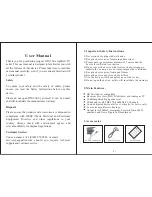
Make sure all cable connections are correct and each
connection is seated/tightened properly.
Inspect the inside of each cable connector for dirt or
possible connector to case/shield short.
Verify the Azimuth, Elevation and Tilt angles for your
location by ZIP code.
Make sure the Tilt and Elevation pointers are aligned
correctly to the scales. Do not use washer or bolt as
reference.
Make sure the Tilt adjustment is
not changed from the
recommended setting for the antenna location.
Make sure the bubble level frame inside the mast is
seated properly, then check the mast alignment again.
The mast not being plumb/up straight is a major cause
of alignment difficulty.
R emove existing TV-specific components, such as TV
splitter, etc; reduce the installation to the basic
connections called out in this guide. Such components
may not work with the satellite signal and they may be in
the wall where you can’t see them. When in doubt, run R G
6 cable directly to your receiver.
Make sure there are no obstructions (trees, buildings,
windows, corner or overhang of your roof, your body or
hands) - the signal does not pass leaves, branches, glass,
etc. Also, keep in mind the 18° span clearance to receive
all three satellite locations. This required clearance may
also mean you’ll need to consider a new location when
replacing an old 18" dish with this new Multi-Satellite Dish
Antenna.
11
DIRECTV Multi-Satellite Dish Antenna
Your triple-head LNB depends on the receiver to supply
power; the longer the cable length to the LNB , the greater
the DC voltage drop. Your receiver depends on the antenna
to supply signal; the longer the cable length, the greater
the signal amplitude attenuation. Therefore, R G 6 cable
length much longer than 100 feet (from each the receiver
to the antenna) should be avoided.
R G 6 cable with solid copper center conductor is highly
recommended because it has much lower DC voltage drop
compared to R G 6 cable with a copper-coated, steel center
conductor.
Standard R G 59 cable causes too much DC drop and
signal drop; it can not be used to pass the satellite signal.
R G 6 coaxial cable must be used.
Some after-market, off-the-shelf add-on components may
not be as advertised. They might not work or could cause
additional DC drops and signal amplitude attenuation.
R emove such components, go back to the basic
connections called out in this manual and re-verify.
Make sure the satellite cable is connected to the “ S at In”
jack, not the “ Antenna In” jack. The “ Antenna In” jack
at the back of the receiver is for off-air antenna input or
cable TV input.
If you live in a state on the Eastern Seaboard, you may
need to fine-tune your Tilt Adjustment. Follow directions
from NOTE 2, page 10.
Troubleshooting Check List for Initial Installation
If the signal is not found, be sure the receiver user manual and the antenna installation manual have been properly followed. Check to:
Make sure the Access Card from your receiver is fully
inserted into the Access Card slot and oriented correctly.
If all are done correctly but the signal is still not found,
change the Elevation adjustment of the antenna slightly
(± 2°, then ± 4° from the called-for setting) and repeat the
procedure.






























